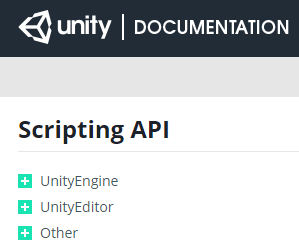 One frustrating aspect of Unity is the documentation. Despite the effort of Unity to educate users, I still find myself searching on the internet. Why? There are many factors.
One frustrating aspect of Unity is the documentation. Despite the effort of Unity to educate users, I still find myself searching on the internet. Why? There are many factors.When I first started learning Unity, I was very excited to find on the Unity site so many tutorials, both in video format and text format. Unfortunately, the tutorials in text format, which I prefer, are few. I started viewing some of the video tutorials, but I eventually put them aside.
You may be different, but I often find the video tutorials tedious, even if informative. A video requires the viewers to follow its chosen presentation sequence. While I have no problem with this in a movie, it is too restrictive for me in a tutorial. Of course, a document also has a presentation sequence, but the readers can jump to different parts of a document quickly and easily. Even with the pause/forward/rewind capabilities, scanning to different parts of a video is cumbersome.
I have had to re-watch various parts of this 2D Game Development Walkthrough many times, simply because it covers so many topics so quickly. I am tired of that. Give me a well written document, which I can read quickly to get the gist, and back to which I can refer when I need.
After a few weeks of experimentation, and having gained confidence, I became more impatient. I started wanting to learn things more quickly: quicker than reading through a tutorial or watching a video. Moreover, as I started making my game, I often need detailed documentations on how to implement certain features of my design.
So, even though I still browse through the tutorials for ideas, I have started going directly to the Unity Manual and Scripting API, and searching on the internet.
Here is where I encounter problems.
Sometimes I find the information to be incomplete. There could be just a hint on how to do things, or some of the steps are (inadvertently) missing. However, that's often the case when one tries to learn something by oneself. One can only remain persistent with this.
Sometimes the information is incorrect, in the sense that it is no longer applicable. Unity actively updates its game engine with new features, and revising or eliminating older ones, which is a big positive. However, this creates a problem for web documents, forum articles, and blogs written about Unity: they become out-of-date.
The gist of the articles might be correct, but one can waste time, sometimes an inordinate amount of time, to try the suggestions found in those articles. Afterwards, one discovers that Unity version XYZ no longer does it this way.
Now I constantly look at the date of the article, if available, in order to estimate the staleness of the information. Of course, as a newbie, I do not know exactly what has been made obsolete, and when. I can only say, "This discussion is from two years ago, I should be careful about it." Often, the solutions therein are still valid. However, with greater frequency and probability as time goes on and Unity advances, the information can no longer be used.
Perhaps when/if Unity matures, things will be different. Although, if that happens, Unity might not be the advanced game engine we like any longer.
Good luck with your own process of learning Unity.

No comments:
Post a Comment